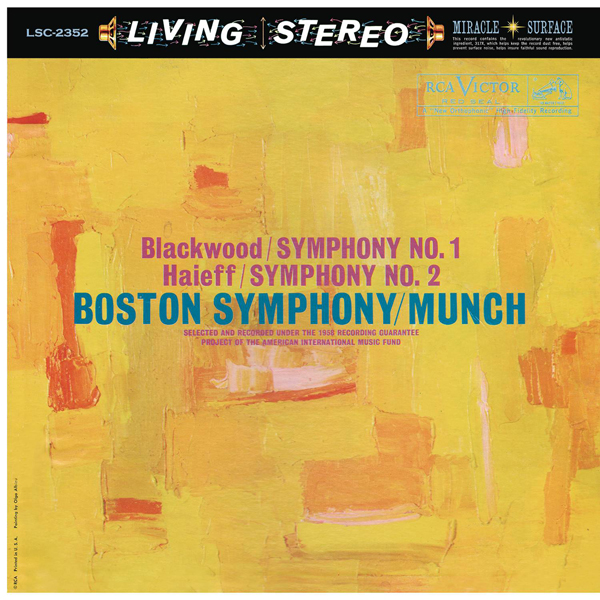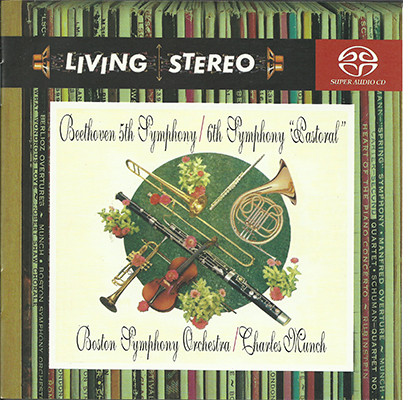
Easley Blackwood: Symphony No. 1 / Alexei Haieff: Symphony No. 2 – Boston Symphony Orchestra, Charles Munch (1959/2016)
FLAC (tracks) 24 bit/192 kHz | Time – 50:26 minutes | 2,09 GB | Genre: Classical
Studio Masters, Official Digital Download – Source: AcousticSounds | Front Cover | © RCA Records
Recorded: Blackwood Symphony recorded Nov. 9, 1958, Symphony Hall; Haieff Symphony recorded Nov. 30, 1958, Symphony Hall
A genial conductor with a particular gift for French music, Charles Münch extended the Boston Symphony’s glory years (begun under the baton of Serge Koussevitzky) into the early ’60s. Münch was born in the province of Alsace-Lorraine, which at the time (1891) was controlled by Germany and has long hovered between two cultural worlds. Münch himself benefited from both French and German musical training, and his first important musical posts were in Germany. Yet he came to be regarded as the quintessential French conductor, and his recordings of French repertory with the Boston Symphony remain standards by which others are judged. Münch studied violin at the Strasbourg Conservatory, where his father was a professor, and, from 1912, in Paris with Lucien Capet. As an Alsatian, he was conscripted into the German army at the outbreak of World War I. Gassed and wounded as an artillery sergeant, he nevertheless survived the war through sheer resiliency. In 1919, upon returning to Alsace-Lorraine (now back in French hands), he took French citizenship, and a violin professorship in Strasbourg. Nevertheless, his professional interests soon sent him to Germany; he studied violin with Carl Flesch in Berlin, then moved to Leipzig to take a violin professorship at the conservatory there, and then became concertmaster of the Leipzig Gewandhaus Orchestra from 1926 to 1933, during Furtwängler’s tenure.
But it was back in Paris, in 1933, where Münch made his successful conducting debut in a self-financed concert with the Straram Orchestra. He conducted the Paris Orchestre de la Société Philharmonique (1935-1938) and in 1937 was named director of the Société des Concerts du Conservatoire de Paris, a post he held through World War II. Münch introduced many new works, including, in 1945, Messiaen’s L’Ascension; he quickly became known as a conductor attentive to music’s larger formal structures, as well as details of color and sonority. Despite his allegiances 25 years before, Münch refused to collaborate with the Nazis, and indeed supported the French resistance; he was awarded the Légion d’honneur in 1945.
Münch’s career quickly accelerated after the war. In 1946, he made his debut with the Boston Symphony (and several other American orchestras) as a guest conductor, and he toured America with the French National Radio Orchestra in 1948. The following year, he was appointed music director of the Boston Symphony, which he took on an unprecedented tour of the Soviet Union in 1956. Münch retired from the BSO in 1962 but continued to guest conduct, and helped Serge Baudo launch the Orchestre de Paris in 1967. On tour in America with that orchestra, he died the following year.
Münch was easygoing in rehearsal, reluctant to drill the spontaneity out of an orchestra. He was particularly noted as an elegant, colorful interpreter of French music of the nineteenth and twentieth centuries; his recordings of that material with the Boston Symphony for RCA are still regarded as classics of their kind. He was a strong advocate for the Franco-Swiss composers of his own generation, especially Roussel, Milhaud, and Honegger. But he also had a good touch with the conservative contemporary music of other lands, as may be heard in his few but important recordings of Martinu, Piston, and Barber. Indeed, during his Boston years Münch’s commitment to American music was almost as strong as his allegiance to new French works. -Artist Biography by James Reel
Tracklist:
Easley Blackwood (b.1933)
Symphony No. 1, Op. 3
1 I. Andante maestoso – Non troppo allegro ma con spirito 09:090
2 II. Andante comodo 05:540
3 III. Allegretto grotesco 05:250
4 IV. Andante sostenuto 10:560
Alexei Haieff (1914-1994)
Symphony No. 2
5 I. Maestoso – Doppio Movimento 06:100
6 II. Andante 06:370
7 III. Maestoso 06:11
Personnel:
Boston Symphony Orchestra
Charles Münch, conductor
Download:
mqs.link_BlackwdSymphnyN.1HaieffSymphnyN.2BSCharlesMunch19592016AcusticSunds24192.part1.rar
mqs.link_BlackwdSymphnyN.1HaieffSymphnyN.2BSCharlesMunch19592016AcusticSunds24192.part2.rar
mqs.link_BlackwdSymphnyN.1HaieffSymphnyN.2BSCharlesMunch19592016AcusticSunds24192.part3.rar




















![Boston Symphony Orchestra, Charles Munch - Walter Piston: Symphony No. 6; Bohuslav Martinu: Fantasies Symphoniques (1957/2016) [AcousticSounds FLAC 24bit/192kHz] Boston Symphony Orchestra, Charles Munch - Walter Piston: Symphony No. 6; Bohuslav Martinu: Fantasies Symphoniques (1957/2016) [AcousticSounds FLAC 24bit/192kHz]](https://getimg.link/images/imgimgimg/uploads/2018/03/GmB7TqB.jpg)
![Boston Symphony Orchestra, Charles Munch - Beethoven: Overtures (1956/2016) [AcousticSounds FLAC 24bit/192kHz] Boston Symphony Orchestra, Charles Munch - Beethoven: Overtures (1956/2016) [AcousticSounds FLAC 24bit/192kHz]](https://getimg.link/images/imgimgimg/uploads/2018/12/rCOmZgF.jpg)
![Charles Munch - Mendelssohn: Symphony 4 & 5 by Charles Munch (2023) [FLAC 24bit/96kHz] Charles Munch - Mendelssohn: Symphony 4 & 5 by Charles Munch (2023) [FLAC 24bit/96kHz]](https://imghd.xyz/images/2023/09/16/qdm0d9jv1cyhb_600.jpg)
![Andris Nelsons, Boston Symphony Orchestra - Shostakovich: Symphonies Nos. 5, 8 & 9; Suite From "Hamlet" (2016) [FLAC 24bit/96kHz] Andris Nelsons, Boston Symphony Orchestra - Shostakovich: Symphonies Nos. 5, 8 & 9; Suite From "Hamlet" (2016) [FLAC 24bit/96kHz]](https://getimg.link/images/imgimgimg/uploads/2017/08/GBVruYe.jpg)
![Serge Gainsbourg & Brigitte Bardot - Bonnie and Clyde (1968/2016) [FLAC 24bit/48kHz] Serge Gainsbourg & Brigitte Bardot - Bonnie and Clyde (1968/2016) [FLAC 24bit/48kHz]](https://getimg.link/images/imgimgimg/uploads/2019/07/T1pWXL8.jpg)
![Zuzana Ruzickova - J.S. Bach: The Complete Keyboard Works (2016) [FLAC 24bit/96kHz] Zuzana Ruzickova - J.S. Bach: The Complete Keyboard Works (2016) [FLAC 24bit/96kHz]](https://getimg.link/images/imgimgimg/uploads/2018/09/r94XYtX.jpg)
![Gianluca Luisi - Bach: French Suites, BWV 812-817 (2018) [FLAC 24bit/88,2kHz] Gianluca Luisi - Bach: French Suites, BWV 812-817 (2018) [FLAC 24bit/88,2kHz]](https://getimg.link/images/imgimgimg/uploads/2019/10/LIyhrow.jpg)
![Itzhak Perlman - The Complete Warner Recordings 1972-1980 (2015) [FLAC 24bit/96kHz] Itzhak Perlman - The Complete Warner Recordings 1972-1980 (2015) [FLAC 24bit/96kHz]](https://getimg.link/images/imgimgimg/uploads/2019/12/IpmBmeR.jpg)
![Charles Munch, Orchestre De Paris - Berlioz: Symphony Fantastique / Brahms: Symphony No.1 (1968) [Japan 2018] [SACD ISO + DSF DSD64 + Hi-Res FLAC] Charles Munch, Orchestre De Paris - Berlioz: Symphony Fantastique / Brahms: Symphony No.1 (1968) [Japan 2018] [SACD ISO + DSF DSD64 + Hi-Res FLAC]](https://imghd.xyz/images/2024/03/25/0080ac70.jpg)

![Aaron Copland - Symphony No. 3 - London Symphony Orchestra, Aaron Copland (1958/2013) [HDTracks FLAC 24bit/192kHz] Aaron Copland - Symphony No. 3 - London Symphony Orchestra, Aaron Copland (1958/2013) [HDTracks FLAC 24bit/192kHz]](https://getimg.link/images/imgimgimg/uploads/2016/02/6zbtr9y.jpg)
![Murray Perahia - Bach: The French Suites (2016) [FLAC 24bit/96kHz] Murray Perahia - Bach: The French Suites (2016) [FLAC 24bit/96kHz]](https://getimg.link/images/imgimgimg/uploads/2018/03/7OIXrV4.jpg)
![Vladimir Ashkenazy - Bach: French Suites, BWV 812-817 (2017) [Qobuz FLAC 24bit/96kHz] Vladimir Ashkenazy - Bach: French Suites, BWV 812-817 (2017) [Qobuz FLAC 24bit/96kHz]](https://getimg.link/images/imgimgimg/uploads/2017/12/fibDaF8.jpg)
![Boston Symphony Orchestra, Charles Munch - Beethoven: Symphony No. 9 (1959/2016) [HDTracks FLAC 24bit/192kHz] Boston Symphony Orchestra, Charles Munch - Beethoven: Symphony No. 9 (1959/2016) [HDTracks FLAC 24bit/192kHz]](https://getimg.link/images/imgimgimg/uploads/2018/08/0rC5GLG.jpg)
![Charles Munch, Boston Symphony Orchestra - Berlioz: Symphonie Fantastique (1962/2012) [HDTT FLAC 24bit/192kHz] Charles Munch, Boston Symphony Orchestra - Berlioz: Symphonie Fantastique (1962/2012) [HDTT FLAC 24bit/192kHz]](https://getimg.link/images/imgimgimg/uploads/2017/04/dr71kcl.jpg)